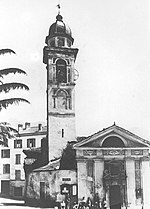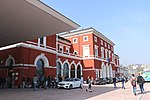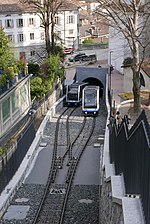Lugano (, UK also , Italian: [luˈɡaːno]; Ticinese: Lugan [lyˈɡãː]) is a city and municipality in Switzerland, part of the Lugano District in the canton of Ticino. It is the largest city of both Ticino and the Italian-speaking southern Switzerland. Lugano has a population (as of December 2020) of 62,315, and an urban agglomeration of over 150,000. It is the ninth largest Swiss city.
The city lies on Lake Lugano, at its largest width, and, together with the adjacent town of Paradiso, occupies the entire bay of Lugano. The territory of the municipality encompasses a much larger region on both sides of the lake, with numerous isolated villages. The region of Lugano is surrounded by the Lugano Prealps, the latter extending on most of the Sottoceneri region, the southernmost part of Ticino and Switzerland. Both western and eastern parts of the municipality share an international border with Italy.
Described as a market town since 984, Lugano was the object of continuous disputes between the sovereigns of Como and Milan until it became part of the Old Swiss Confederation in 1513. In 1803, the political municipality of Lugano was created, following the establishment of the canton. Since 1882, Lugano is an important stop on the international Gotthard Railway. The rail brought a decisive contribution to the development of tourism and more generally of the tertiary sector which are, to this day, predominant in the economy of the city.
In 1956, Lugano hosted the first ever Eurovision Song Contest.






